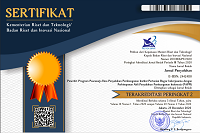ANALISIS USAHATANI JAGUNG PADA LAHAN KERING DI KECAMATAN LIMBOTO KABUPATEN GORONTALO
Keywords:
Maize farming, production cost, production rate, earnings
Abstract
The objectives of this action research are 1) to describe the structure of expenses of the maize farming at dry farming system, 2) to describe the production and farmers earnings at maize dry farming system. Research Method used is survey method, consisted of the survey of primary and secondary data. Variable perceived is maize farmer labouring maize crop to fulfill its requirement, maize farming conducted at dry farming, produce the maize farming, earnings of maize farming, medium produce, and good labour of labour in and also household outdoors labour of doorstep. Intake sampel conducted by purposive summed uply is farmer becoming sampel is 30 people deputize the population of maize farmer of counted 150 people. Result of research of there are ratio difference of between production cost and production rate at maize farming of maize of hibrida and composite maize farming in dry farming with the value R/C ratio more than 1. For the earnings of, farmer planting compared to higher maize hibrida of farmer earnings planting composite maize with the comparison ratio is 2,60.Downloads
Published
2008-03-01
How to Cite
BahuaI. (2008). ANALISIS USAHATANI JAGUNG PADA LAHAN KERING DI KECAMATAN LIMBOTO KABUPATEN GORONTALO. Jurnal Penyuluhan, 4(1). https://doi.org/10.25015/penyuluhan.v4i1.2168
Section
Articles
Authors who publish with this journal agree to the following terms:
- Authors retain copyright and grant the journal right of first publication with the work simultaneously licensed under a

This work is licensed under a Creative Commons Attribution 4.0 International License that allows others to share the work with an acknowledgement of the work's authorship and initial publication in this journal. - Authors are able to enter into separate, additional contractual arrangements for the non-exclusive distribution of the journal's published version of the work (e.g., post it to an institutional repository or publish it in a book), with an acknowledgement of its initial publication in this journal.
- Authors are permitted and encouraged to post their work online (e.g., in institutional repositories or on their website) prior to and during the submission process, as it can lead to productive exchanges, as well as earlier and greater citation of published work (See The Effect of Open Access).















